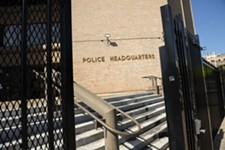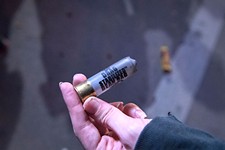Nine APD Officers No-Billed in Aquantis Griffin Shooting
Grand jury clears officers who killed 21-year-old in 2018 shooting
By Austin Sanders, Fri., Nov. 12, 2021
Before his fatal encounter with police Griffin, a 21-year-old Black man visiting from Louisiana to watch a childhood friend perform in Austin, was involved in an altercation outside of Downtown's Terminal 6 bar, resulting in gunfire. At that time, Griffin was unarmed, according to a filing in his family's civil suit, but after being fired at, he left to grab a firearm. While running back to the scene, he turned a corner and saw a line of armed officers. As they shouted commands for him to drop his weapon, Griffin turned abruptly and as he did so, the filing claims, his arm swung in a natural motion toward the officers. The officers have since said they viewed this as a threatening gesture and opened fire.
Bystander video shows Griffin fall to the ground after a first round of gunshots, before being hit with more than 30 more rounds while lying motionless. Scott Hendler, a local attorney representing the Griffin family, says this latter fact is critical to the wrongful death claim – but the family was not allowed to present it in court. Instead, Yeakel dismissed the case pursuant to Federal Rules of Civil Procedure Rule 12(b)(6), holding that the plaintiffs did not "state a claim for which relief can be granted" – meaning, in this case, they hadn't shown Griffin's death resulted from potential police misconduct. Hendler claims the decision was "flawed substantively and procedurally" and is preparing to file a motion to reconsider in Yeakel's court, hopefully before the year ends. If that motion fails, the family could appeal the dismissal to the 5th U.S. Circuit Court of Appeals.
"If the Austin Police Department were to say the high number of rounds were the result of 'sympathetic fire,'" as police often do in similar cases, Hendler said, "that would be bullshit. It was a firing squad, and we want to evaluate the conduct of each officer independently." That would require collecting testimony from the officers, along with other evidence, through discovery in the civil litigation, which was short-circuited by Yeakel's ruling.
Got something to say on the subject? Send a letter to the editor.











